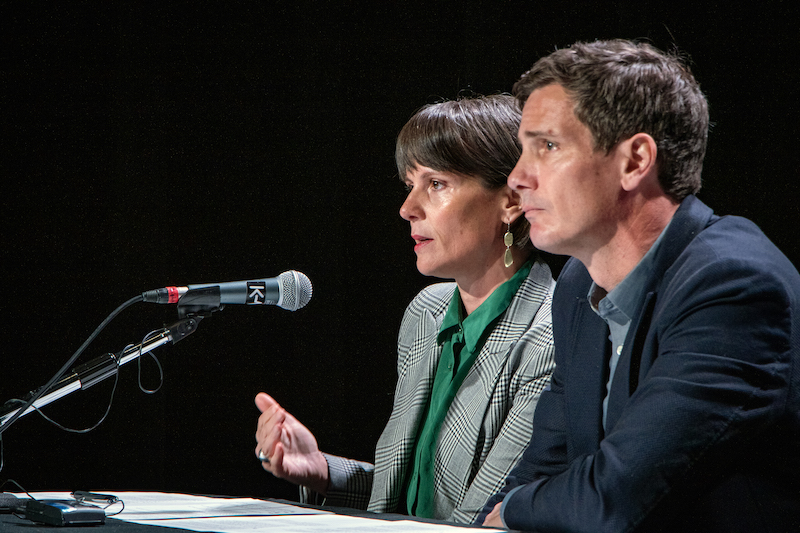The Drug User Liberation Front (DULF) in Vancouver has outlined its intended defense to criminal charges against two of its founders for distributing tested heroin, methamphetamine and cocaine. It’s framing the charges, against a compassion club designed to save lives, as unconstitutional.
In an October 15 press conference, Erys Nyx and Jeremy Kalicum, along with lawyers Stephanie and Tim Dickson, announced their intention to pursue a couple different defenses, including challenges to the charges under the Canadian Charter of Rights and Freedoms.
Stephanie Dickson said the compassion club operated in a designated “urgent public health needs site,” which exempts it from certain provisions of the Controlled Drugs and Substances Act (CDSA), including possession for the purpose of trafficking.
That designation comes from DULF’s operation of an overdose prevention site, though the organization’s application to Health Canada for a separate exemption to the CDSA to operate a compassion club was denied.
“The objectives of the Controlled Drugs and Substances Act are public health and public safety, and the compassion club advanced public health and public safety.”
“In addition, we expect to demonstrate that to any extent that designation did not exempt the compassion club from section 5(2) of the CDSA, then that provision breaches Section 7 and Section 15 of the charter,” Stephanie Dickson said.
Section 7 of the Charter of Rights and Freedoms guarantees the right to life, liberty and security of the person, while Section 15 protects against discrimination based on race, national or ethnic origin, color, religion, sex, age, or mental or physical disability.
On the latter, Tim Dickson said the compassion club’s members “all had serious dependencies,” meaning they couldn’t just stop using drugs.
“This is not a ‘just say no’ kind of situation,” he said, noting that Section 15 “draws that distinction on the basis of a recognized disability, which is addiction.”

Stephanie and Tim Dickson
On Section 7, he said prohibiting compassion club members from accessing a safe, predictable supply forces them to obtain drugs from an unpredictable street supply, exposing them to risk of serious injury.
“We say that is arbitrary,” Tim Dickson said. “The objectives of the Controlled Drugs and Substances Act are public health and public safety, and the compassion club advanced public health and public safety. It protected lives. It protected members against serious injuries.”
“The prohibition [against DULF] does not advance public health and public safety,” he continued. “It undermines those objectives. But if anyone thought there was a benefit in prohibiting this program, the impacts on the members so outweigh any such benefits that the prohibition is grossly disproportionate.”
Erys Nix and Jeremy Kalicum were arrested in October 2023. DULF and their homes were raided, as a backlash against safe supply took root in British Columbia. In late 2022, Conservative parties in the province, after years of relative quiet on harm reduction, had begun railing against policies like safe supply.
In response, the governing BC New Democratic Party was quick to defund DULF’s overdose prevention site, and the Vancouver Police Department soon thereafter conducted its raid.
On May 31, after months of rallies in support of DULF, Crown prosecutors approved charges against Nyx and Kalicum, who each face three counts of possession for the purpose of trafficking. The charges could theoretically—though it’s highly unlikely—carry sentences of up to life imprisonment.
DULF also sought a judicial review of Health Canada’s denial of a CDSA exemption for the compassion club, and a Federal Court hearing was held in March. The Dicksons are representing DULF in that case too, with a decision still pending. They declined to speculate at the press conference on how the outcome of that case could impact the criminal case.
“People’s wellbeing has been catastrophically impacted by the closure of the program. And some folks we haven’t even been able to get in touch with, and I do worry immensely about them.”
Nyx said that the difference between a supply of tested heroin and the street supply “is night and day,” and cutting people off of the DULF supply puts them at a far greater risk of overdose and death.
“Many people who were kicked off the program have been overdosing more, but they’re also at risk of all the other contaminants that are cut into the illicit drug supply,” she said, contrasting pure heroin with a substance that has been cut with xylazine, benzodiazepines, “or even worse, drywall dust or rat feces, lord knows what else.”
“People’s wellbeing has been catastrophically impacted by the closure of the program,” she said. “And some folks we haven’t even been able to get in touch with, and I do worry immensely about them.”
Nyx noted at the top of the press conference that DULF’s announcement comes halfway through the eighth year of a drug-related public health emergency, one she framed as perhaps the worst public health crisis in BC history.
“Very little is being done to prevent deaths, which are skyrocketing. Each month, an airplane full of people dies from a deregulated and toxic drug supply,” Nyx said. “We want to demonstrate how deeply unfair and discriminatory it is to prevent drug users from saving lives, from saving the lives of the people they care about the most.”

From left: Stephanie and Tim Dickson, Jeremy Kalicum, Erys Nyx
While opponents of harm reduction have characterized the movement as being against recovery, Nyx said that’s untrue—and acknowledged the need for a “full continuum of care,” ranging from abstinence-based treatment through to compassion clubs.
Kalicum said he has helped people trying to access treatment, but has struggled to navigate a system in which waitlists run from months to over a year.
“In this crisis, it is a shame that we are being criminally prosecuted for saving lives,” Nyx said, noting that Vancouver’s Downtown Eastside, where DULF’s compassion club operated, sees 556.8 people die of overdose per 100,000 population—amounting to one in 180 people dying each year.
“These deaths are caused by the deregulation of the illicit drug supply, and that is a byproduct of a prohibitionist regime, a regime which is outdated and dangerous to folks who use drugs,” she said.
“It is mindblowing that what precipitated the enforcement against us was politicization.”
Kalicum said the intention behind DULF’s compassion club was to research a potential model for inclusion in the continuum of care—one he said prioritized input and transparency to ensure the best outcomes.
“We talked to whoever we could whenever we could to get input on what we were doing—and this included talking to police, to every level of government, to the health authorities, to research institutions, treatment centres, community media, and the public,” Kalicum said, adding that the federal minister of mental health and addictions visited the compassion club prior to the raids.
“At every step of the way, with every stakeholder we talked to, we asked for feedback,” Kalicum said. “We asked for concerns. We had never gotten any concerns. Every stakeholder, they only gave us praise for what we were doing. It is mindblowing that what precipitated the enforcement against us was politicization.”
He said DULF’s reassurances to authorities even included expressing willingness to shut down if, at any point, they were asked to—“but nobody ever did.”
Kalicum also noted that the compassion club’s data gathering has led to the publication of two peer-reviewed papers so far, with more in progress.
That research has shown statistically significant reductions in overall hospitalizations, in overdoses requiring naloxone administration and in overdoses overall among compassion club participants. And despite thousands of doses of DULF-provided drugs being witnessed at the compassion club, none resulted in overdoses.
“This would not happen with street drugs,” Kalicum said. “These are groundbreaking findings that need to be looked at. For them to just be shoved to the side is politicization at its most heinous.”
Qualitative research by DULF additionally showed that nearly two-thirds of members reported reducing their drug use because of the compassion club, with more than two-fifths reporting their membership helped them to stop using drugs altogether.
It also found that DULF helped reduce the risk of violence, helped reduce negative interactions with police and helped reduce reliance on criminal activity, for roughly three-quarters of members in each case.
“DULF ran a market regulation project, a project designed to save the lives of folks we care about most.”
“What we’re seeing is reduced overdoses, reduced money going to the illicit market and reductions in crime,” Kalicum said. “These are things we all want to see in society.”
“It doesn’t take a lot of reasoning to see that the positives that we stated, without the club, turn to negatives,” he continued. “So without the club, more money goes to the illicit market and organized crime. Without the club, overdoses go up.”
He particularly noted that those who were able to quit drugs because of DULF won’t have access to that predictable supply in the event that they resume use—which is common with abstinence-based treatment, and which leaves people who use opioids, in particular, vulnerable to overdose due to lowered tolerance.
Nyx added that the prescriber-based safe supply model pushed by the provincial government—which the BC Conservatives have spent the last two years demonizing—is ill-equipped to address the enormity of problems created by prohibition.
Access is “extremely limited, especially outside of urban centers,” she noted, amid barriers like daily witnessed ingestion, urine testing, and high diagnostic and monitoring requirements.
“It is from this standpoint that DULF ran a market regulation project,” Nyx said, “a project designed to save the lives of folks we care about most.”
All photographs, including top photograph of Kalicum and Nyx, by Dustin Godfrey




